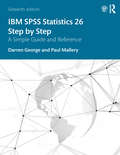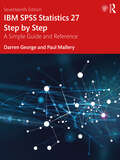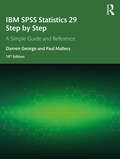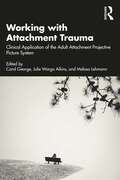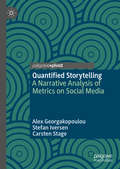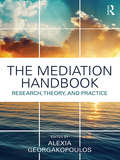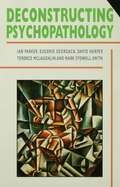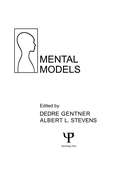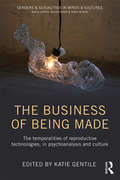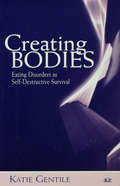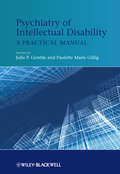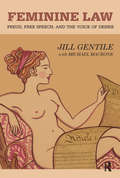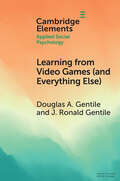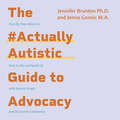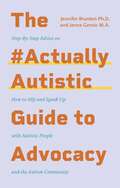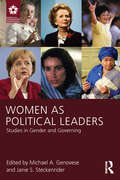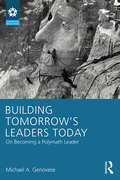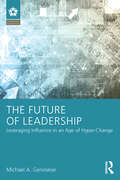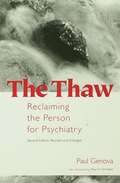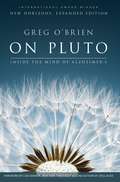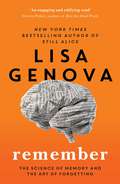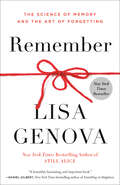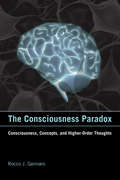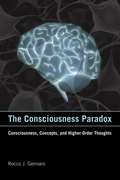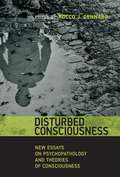- Table View
- List View
IBM SPSS Statistics 26 Step by Step: A Simple Guide and Reference
by Darren George Paul MalleryIBM SPSS Statistics 26 Step by Step: A Simple Guide and Reference, sixteenth edition, takes a straightforward, step-by-step approach that makes SPSS software clear to beginners and experienced researchers alike. Extensive use of four-color screen shots, clear writing, and step-by-step boxes guide readers through the program. Output for each procedure is explained and illustrated, and every output term is defined. Exercises at the end of each chapter support students by providing additional opportunities to practice using SPSS. This book covers the basics of statistical analysis and addresses more advanced topics such as multi-dimensional scaling, factor analysis, discriminant analysis, measures of internal consistency, MANOVA (between- and within-subjects), cluster analysis, Log-linear models, logistic regression and a chapter describing residuals. Back matter includes a description of data files used in exercises, an exhaustive glossary, suggestions for further reading and a comprehensive index. IMB SPSS Statistics 26 Step by Step is distributed in 85 countries, has been an academic best seller through most of the earlier editions, and has proved invaluable aid to thousands of researchers and students. New to this edition: Screenshots, explanations, and step-by-step boxes have been fully updated to reflect SPSS 26 How to handle missing data has been revised and expanded and now includes a detailed explanation of how to create regression equations to replace missing data More explicit coverage of how to report APA style statistics; this primarily shows up in the Output sections of Chapters 6 through 16, though changes have been made throughout the text.
IBM SPSS Statistics 27 Step by Step: A Simple Guide and Reference
by Darren George Paul MalleryIBM SPSS Statistics 27 Step by Step: A Simple Guide and Reference, seventeenth edition, takes a straightforward, step-by-step approach that makes SPSS software clear to beginners and experienced researchers alike. Extensive use of four-color screen shots, clear writing, and step-by-step boxes guide readers through the program. Output for each procedure is explained and illustrated, and every output term is defined. Exercises at the end of each chapter support students by providing additional opportunities to practice using SPSS. This book covers the basics of statistical analysis and addresses more advanced topics such as multidimensional scaling, factor analysis, discriminant analysis, measures of internal consistency, MANOVA (between- and within-subjects), cluster analysis, Log-linear models, logistic regression, and a chapter describing residuals. The end sections include a description of data files used in exercises, an exhaustive glossary, suggestions for further reading, and a comprehensive index. IBM SPSS Statistics 27 Step by Step is distributed in 85 countries, has been an academic best seller through most of the earlier editions, and has proved an invaluable aid to thousands of researchers and students. New to this edition: Screenshots, explanations, and step-by-step boxes have been fully updated to reflect SPSS 27 A new chapter on a priori power analysis helps researchers determine the sample size needed for their research before starting data collection.
IBM SPSS Statistics 29 Step by Step: A Simple Guide and Reference
by Darren George Paul MalleryIBM SPSS Statistics 29 Step by Step: A Simple Guide and Reference, eighteenth edition, takes a straightforward, step-by-step approach that makes SPSS software clear to beginners and experienced researchers alike.Extensive use of four-color screen shots, clear writing, and step-by-step boxes guide readers through the program. Output for each procedure is explained and illustrated, and every output term is defined. Exercises at the end of each chapter support students by providing additional opportunities to practice using SPSS. This book covers the basics of statistical analysis and addresses more advanced topics such as multidimensional scaling, factor analysis, discriminant analysis, measures of internal consistency, MANOVA (between- and within-subjects), cluster analysis, Log-linear models, logistic regression, and a chapter describing residuals. New to this edition is a new chapter on meta-analysis that describes new SPSS procedures for analyzing effect sizes across studies, and the content has been thoroughly updated in line with the latest version of the SPSS software, SPSS 29. The end sections include a description of data files used in exercises, an exhaustive glossary, suggestions for further reading, and a comprehensive index.Accompanied by updated online instructor’s materials and website data files, this is an essential resource for instructors and students needing a guide to using SPSS in their work, across the social sciences, behavioural sciences, education, and beyond.
Working with Attachment Trauma: Clinical Application of the Adult Attachment Projective Picture System
by Carol GeorgeThe Adult Attachment Projective Picture System (AAP) has served as a prominent assessment tool for adults and adolescents internationally for over 20 years. This book introduces the AAP and illustrates the powerful potential for implementing the AAP in clinical practice for assessment, client conceptualization, treatment planning, analysis, and as a therapeutic guide. Chapters discuss the full scope of incomplete pathological mourning for attachment trauma, including for the first time in the field Failure to Mourn and Preoccupation with Personal Suffering. Seasoned clinical researchers and psychotherapists provide a snapshot of their clients' unique attachment characteristics and defensive exclusion strategies as assessed by the AAP, and discuss how to use this information in treatment, as well as how to present the AAP results to their clients. This book introduces readers to how the AAP can be used with adolescents, adults, and couples, and in custody evaluation and foster care.
Quantified Storytelling: A Narrative Analysis of Metrics on Social Media
by Alex Georgakopoulou Stefan Iversen Carsten StageThis book interrogates the role of quantification in stories on social media: how do visible numbers (e.g. of views, shares, likes) and invisible algorithmic measurements shape the stories we post and engage with? The links of quantification with stories have not been explored sufficiently in storytelling research or in social media studies, despite the fact that platforms have been integrating sophisticated metrics into developing facilities for sharing stories, with a massive appeal to ordinary users, influencers and businesses alike. With case-studies from Instagram, Reddit and Snapchat, the authors show how three types of metrics, namely content metrics, interface metrics and algorithmic metrics, affect the ways in which cancer patients share their experiences, the circulation of specific stories that mobilize counter-publics and the design of stories as facilities on platforms. The analyses document how numbers structure elements in stories, indicate and produce engagement and become resources for the tellers’ self-presentation. This book will be of interest to students and scholars working in the fields of narrative and social media studies, including narratology, biography studies, digital storytelling, life-writing, narrative psychology, sociological approaches to narrative, discourse and sociolinguistic perspectives.
The Mediation Handbook: Research, theory, and practice
by Alexia GeorgakopoulosThe Handbook of Mediation gathers leading experts across fields related to peace, justice, human rights, and conflict resolution to explore ways that mediation can be applied to a range of spectrums, including new age settings, relationships, organizations, institutions, communities, environmental conflicts, and intercultural and international conflicts. The text is informed by cogent theory, state-of-the-art research, and best practices to provide the reader with a well-rounded understanding of mediation practice in contemporary times. Based on four signature themes—contexts; skills and competencies; applications; and recommendations—the handbook provides theoretical, applicable, and practical insight into a variety of key approaches to mediation. Authors consider modern conflict on a local and global scale, emphasizing the importance of identifying effective strategies, foundations, and methods to shape the nature of a mediation mindfully and effectively. With a variety of interdisciplinary perspectives, the text complements the development of the reader’s competencies and understanding of mediation in order to contribute to the advancement of the mediation field. With a conversational tone that will welcome readers, this comprehensive book is essential reading for students and professionals wanting to learn a wide range of potential interventions for conflict.
Deconstructing Psychopathology
by Dr Eugenie Georgaca Dr David Harper Mr Terence Mclaughlin Dr Mark Stowell-Smith Professor Ian Patrick`Fast becoming a contemporary classic... this book tries both to be critical and engender critical thinking in a number of ways. It offers an overview of a number of theories that address human distress as well as particular forms of "pathology". This book effectively highlights the way that western society has taken "normal"; and "abnormal" emotional states to be factual entities rather than the constructed understandings of human phenomena that they are.... should be on the reading list of every course/module that attends to human distress' - Journal of the Society for Existential Analysis This practical and accessible critique of the institutions, practices and presuppositions that underlie the study of `psychopathology' will be invaluable for students and practitioners who are working to understand mental health and distress. The authors - who come from backgrounds in clinical psychology, psychiatric social work, psychoanalysis, psychology teaching and action research - challenge the traditions of the field. They analyze the notion of `psychopathology' as a conventional term in psychology and psychiatry through the language and institutions that hold it in place; and explore the implications of deconstructive ideas for the theories and practices that sustain clinical treatments; and offer an alternative way of seeing `psychopathology', with accounts of critical professional work and good practice. Deconstructing Psychopathology is invaluable reading for students, academics and practitioners across a range of disciplines who are working to understand mental health and distress, including clinical and counselling psychology, psychiatry, psychiatric social work, counselling and psychotherapy.
Mental Models
by Dedre Gentner Albert L. StevensThis classic volume compiles and describes interdisciplinary research on the formal nature of human knowledge about the world. Three key dimensions that characterize mental models research are examined: the nature of the domain studied, the nature of the theoretical approach, and the nature of the methodology.
The Business of Being Made: The temporalities of reproductive technologies, in psychoanalysis and culture (Genders & Sexualities in Minds & Cultures)
by Katie GentileThe Business of Being Made is the first book to critically analyze assisted reproductive technologies (ARTs) from a transdisciplinary perspective integrating psychoanalytic and cultural theories. It is a ground-breaking collection exploring ARTs through diverse methods including interview research, clinical case studies, psychoanalytic based ethnography, and memoir. Gathering clinicians and researchers who specialize in this area, this book engages current research in psychoanalysis, sociology, anthropology, philosophy and debates in feminist, queer and cultural theory about affect, temporality, and bodies. With psychoanalysis as its fulcrum, The Business of Being Made explores the social constructions and personal experiences of ARTs. Katie Gentile frames the cultural context, exploring the ways ARTs have become a complex form of playing with time, attempting to manufacture a hopeful future in the midst of growing global uncertainty. The contributors then present a range of varied experiences related to ARTs, including: Interviews with women and men undergoing ARTs; A psychoanalytic memoir of male infertility; Clinical research and work with transgender, gay and lesbian patients creating new Oedipal constellations, the experiences of LBGTQ people within the medical system and the variety of families that emerge; Research on the experiences of egg donors (now central to the business of ARTs) and a corresponding clinical case study of successful egg donation; The experiences of ongoing failure which is the often unacknowledged for ART procedures; How and when people choose to stop using ARTs; A psychoanalytic ethnography of a neonatal intensive care unit populated in part with the babies created through these technologies and their parents, haggard and in shock after years of failed attempts. Full of original material, The Business of Being Made conveys the ambivalence of these technologies without simplifying their complicated consequences for the bodies of individuals, the family, cultures, and our planet. This book will be relevant to clinicians, medical and psychological personnel working in assisted reproductive technologies and infertility, as well as academics working in the fields of sociology, literature, queer and feminist theories and at the intersections of cultural, critical and psychoanalytic theories.
Creating Bodies: Eating Disorders as Self-Destructive Survival (Relational Perspectives Book Series #33)
by Katie GentileAmid the welter of clinical studies, memoirs, and other death-defying tales of eating disorders, we remain unclear about the relationships among trauma, anorexia, and bulimia, and about the psychological pathways to recovery. Creating Bodies offers the gripping story of healing and transformation detailed in one woman's diaries. Hannah wrote 18 diaries between the ages of 14 and 32. In the excerpts reprinted herein, we watch Hannah navigate violent adolescent friendships, descend into anorexia and bulimia, marry an abusive man, struggle to recover memories of sexual abuse, and finally to heal. And we learn of her interaction with Katie Gentile, who analyzed her diaries and met with Hannah to discuss the latter's own understanding of the diaries and of the diary analysis. Through a close study of both the content and structure of Hannah's diaries, Gentile shows how unspeakable, embodied remnants of sexual trauma become symbolized and how, within this process, Hannah's bulimia functioned as both an act of self destruction and a lifesaving form of resistance. Anchored in relational psychoanalysis and critical feminist theory, Creating Bodies provides a uniquely longitudinal account of the development of, and ultimate recovery from, an eating disorder fueled by childhood sexual abuse. An invaluable contribution to the literature on adolescent and adult eating disorders, it is also a thoughtful meditation on how the act of writing deepens issues of relationality and, over time, promotes cure. Psychoanalysts will be intrigued by the rich process issues embedded in prose journals, notes, and letters - both close to and distinct from clinical process issues - that Gentile uses to understand Hannah's projects of self-destruction and reconstruction.
Psychiatry of Intellectual Disability
by Julie P. Gentile Paulette Marie GilligPatients with intellectual disability (ID) can benefit from the full range of mental health services. To ensure that psychiatric assessment, diagnosis and treatment interventions are relevant and effective; individuals with ID should be evaluated and treated within the context of their developmental framework. Behavior should be viewed as a form of communication.Individuals with ID often present with behavioral symptoms complicated by limited expressive language skills and undiagnosed medical conditions. Many training programs do not include focused study of individuals with ID, despite the fact that patients with ID will be seen by virtually every mental health practitioner. In this book, the authors present a framework for competent assessment and treatment of psychiatric disorders in individuals with ID.Psychiatry of Intellectual Disability is a resource guide for psychiatrists, nurse practitioners, and other prescribers treating patients with ID. It is a supplemental text for psychiatry residents, medical students, psychology graduate students, psychotherapists, counselors, social workers, behavior support specialists and nurses. To assist the practicing clinician the book includes:Clinical vignettesClinical pearlsCharts for quick referenceIssues concerning medications and poly-pharmacyAltered diagnostic criteria specific for use with individuals with IDThere are no evidence-based principles dedicated to psychotropic medication use in ID, but consensus guidelines address the high prevalence of poly-pharmacy. Altered diagnostic criteria have been published which accommodate less self-report and incorporate collateral information; this book reviews the literature on psychotropic medications, consensus guidelines, and population-specific diagnostic criteria sets.Psychiatry of Intellectual Disability also includes:Interviewing techniques and assessment tips for all levels of communicative ability as well as for nonverbal individualsAssessment of aggression to determine etiology and formulate a treatment planOverview of types of psychotherapy and suggested alterations for each to increase efficacyRelevant legal issues for caregivers and treatment providersThe detective work involved in mental health assessment of individuals with ID is challenging yet rewarding. The highest quality mental health treatment limits hospital days, improves quality of life and often allows individuals to live in the least restrictive environments. Psychiatry of Intellectual Disability is a must have resource for clinicians treating the ID population.
Feminine Law: Freud, Free Speech, and the Voice of Desire
by Jill Gentile Michael MacroneFeminine Law: Freud, Free Speech, and the Voice of Desire explores the conjunction between psychoanalysis and democracy, in particular their shared commitments to free speech. In the process, it demonstrates how lawful constraints enable an embodied space or "gap" for the potentially disruptive but also liberating and novel flow of desire and its symbols. This space, intuited by the First Amendment as it is by Freud's free association, enables personal and collective sovereignty. By naming a "feminine law," we mark the primacy a space between the conceivable and the inconceivable, between knowledge and mystery. What do political free speech and psychoanalytic free association have in common, besides the word "free"? And what do Sigmund Freud and Justice Louis Brandeis share besides a world between two great wars? How is the female body a neglected key to understanding the conditions and contradictions of free discourse? Drs. Jill Gentile and Michael Macrone take up these questions, and more, in their wide-ranging, often passionate exploration of the hidden legacy of Freud and the Founding Fathers.
Learning from Video Games: The General Learning Model (Elements in Applied Social Psychology)
by Douglas A. Gentile J. Ronald GentileVideo games can have many effects on players, some of which could be intentional effects (e.g., games designed to train health compliance behaviors), and most of which are unintentional (e.g., violent games, stereotypes, gaming disorder). Some of these areas of research have been seen as controversial, but many of the controversies can be at least partially resolved by considering the learning mechanisms underlying the effects. We describe the General Learning Model in greater detail than has been provided elsewhere, including short-term and long-term mechanisms, processes of learning and forgetting, and moderators of learning. Video games use many of the best practices to train for both mastery and for transfer of learning. The implications for re-interpreting the literature on violent video games and gaming disorder, as well as for applied social psychology broadly defined, are discussed.
The #ActuallyAutistic Guide to Advocacy: Step-by-Step Advice on How to Ally and Speak Up with Autistic People and the Autism Community
by Jenna Gensic Jennifer BruntonThe #ActuallyAutistic Guide to Advocacy takes an in-depth look at the key elements of effective, respectful, inclusive advocacy and allyship. Every topic was chosen, shaped, and informed by #ActuallyAutistic perspectives.The step-by-step guide discusses various aspects of how autism is perceived, explores how best to speak up for individual needs, and introduces advocacy for the wider autistic community. Each step outlines one vital aspect of advocacy and allyship, such as emphasizing acceptance, avoiding assumptions and assuming competence. The advice and strategies laid out in this guide center the wisdom and experiences of Autistic people and enable the listener to confidently speak up with insight and understanding.(P) 2022 Jessica Kinglsey Publishers
The #ActuallyAutistic Guide to Advocacy: Step-by-Step Advice on How to Ally and Speak Up with Autistic People and the Autism Community
by Jenna Gensic Jennifer BruntonThe #ActuallyAutistic Guide to Advocacy takes an in-depth look at the key elements of effective, respectful, inclusive advocacy and allyship. Every topic was chosen, shaped, and informed by #ActuallyAutistic perspectives. The step-by-step guide discusses various aspects of how autism is perceived, explores how best to speak up for individual needs, and introduces advocacy for the wider autistic community. Each step outlines one vital aspect of advocacy and allyship, such as emphasizing acceptance, avoiding assumptions and assuming competence. The advice and strategies laid out in this guide center the wisdom and experiences of Autistic people and enable the reader to confidently speak up with insight and understanding.
Women as Political Leaders: Studies in Gender and Governing (Leadership: Research and Practice)
by Michael A. Genovese Janie S. SteckenriderOver the past several years, the fields of Leadership Studies and of Women's Studies have grown tremendously. This book, which is a series of case studies of women who have headed governments across the globe, will discuss the conditions and situations under which women rose to power and give a brief biography of each woman . A special chapter on why no U.S. woman has risen to the top, and a review of the political campaigns of Hillary Clinton, Michele Bachmann and others will be included. This book will be of interest for courses in women and leadership, global politics and gender studies.
Building Tomorrow's Leaders Today: On Becoming a Polymath Leader (Leadership: Research and Practice)
by Michael A. GenoveseThis book focuses on leadership -- what it is, how it works, and how complex, multi-layered and multi-dimensional it is -- and how it will change in the years ahead. If we are to build tomorrow’s leaders today, we need to anticipate what skills, temperaments, and specific competencies will be valuable as we face future needs. If the past is a predictor of the future, the world of tomorrow will be characterized by rapid change, new technology, greater diversity, increased globalization, and the need for lifelong learning. As a political scientist and presidential scholar, Michael Genovese incorporates a wide range of disciplinary perspectives and research on leadership in this book to give students, practitioners, and leadership scholars a welcome and engaging look to the future.
The Future of Leadership: Leveraging Influence in an Age of Hyper-Change (Leadership: Research and Practice)
by Michael A GenoveseThe Future of Leadership considers how the rapid changes of today will affect the leaders of tomorrow. Renowned Leadership scholar Michael A. Genovese argues that one of the key challenges for future leaders will be to effectively and constructively manage the ‘hyper-change’ taking place both within organizations and in the broader social and political spheres. Taking a Futures Studies approach to envision the state of leadership in the coming decades, Genovese also provides case studies of leaders who have already demonstrated the mind- and skill-sets necessary to successfully manage rapid change.
The Thaw: Reclaiming the Person for Psychiatry
by Paul GenovaPaul Genova's finely crafted essays, which proffer a humanistic and humanizing vision of psychiatry in the face of his profession's preoccupation with target symptoms, "correct" thinking, and medication, have won him a wide and appreciative readership in the pages of Psychiatric Times. This expanded edition of The Thaw, the first collection of his writings, adds seven of Genova's recent pieces, along with one older one, his elegiac "Is American Psychiatry Terminally Ill?" of 1993, to the original collection. An eloquent defender of psychodynamic psychotherapy in an era of generic "trauma stories," drug-driven treatment, and managed care, Genova joins deep erudition, lightly worn, to a pragmatic sensibility that is respectful of the real-world options - behavioral, symptomatic, interpersonal, and otherwise - available to patients from different walks of life. Whether he is reflecting critically on the therapeutic claims of the latest treatment modalities, grappling with the meaning of boundary violations, paying homage to the transformative potential of suffering, or recounting episodes from his own personal and professional odyssey, Genova is a luminous guide, elegant and down to earth, unfailingly thoughtful and thought-provoking, to the trials, tribulations, and healing promise of day-to-day psychotherapeutic work. With vivid immediacy, The Thaw celebrates the renascent healing potential of a contemporary, person-centered psychiatry that is analytically, neuroscientifically, and politically informed. All mental health professionals and many interested lay readers will find much here to illumine their daily struggles.
On Pluto: Inside The Mind Of Alzheimer's
by Lisa Genova Greg O'BrienThis is a book about living with Alzheimer’s, not dying with it. It is a book about hope, faith, and humor—a prescription far more powerful than the conventional medication available today to fight this disease. Alzheimer’s is the sixth leading cause of death in the US—and the only one of these diseases on the rise. More than 5 million Americans have been diagnosed with Alzheimer’s or a related dementia; about 35 million people worldwide. Greg O’Brien, an award-winning investigative reporter, has been diagnosed with early-onset Alzheimer's and is one of those faceless numbers. Acting on long-term memory and skill coupled with well-developed journalistic grit, O’Brien decided to tackle the disease and his imminent decline by writing frankly about the journey. O’Brien is a master storyteller. His story is naked, wrenching, and soul searching for a generation and their loved ones about to cross the threshold of this death in slow motion. On Pluto: Inside the Mind of Alzheimer’s is a trail-blazing roadmap for a generation—both a “how to” for fighting a disease, and a “how not” to give up!
Remember: The Science Of Memory And The Art Of Forgetting
by Lisa GenovaA fascinating exploration of the intricacies of how we remember, why we forget, and what we can do to protect our memories, from the Harvard-trained neuroscientist and bestselling author of Still Alice. Have you ever felt a crushing wave of panic when you can&’t for the life of you remember the name of that actor in the movie you saw last week, or you walk into a room only to forget why you went there in the first place? If you&’re over forty, you&’re probably not laughing. You might even be worried that these lapses in memory could be an early sign of Alzheimer&’s or dementia. In reality, for the vast majority of us, these examples of forgetting are completely normal. Why? Because while memory is amazing, it is far from perfect. Our brains aren&’t designed to remember every name we hear, plan we make, or day we experience. Just because your memory sometimes fails doesn&’t mean it&’s broken or succumbing to disease. Forgetting is actually part of being human. In Remember, neuroscientist and acclaimed novelist Lisa Genova delves into how memories are made and how we retrieve them. You&’ll learn whether forgotten memories are temporarily inaccessible or erased forever and why some memories are built to exist for only a few seconds (like a passcode) while others can last a lifetime (your wedding day). You&’ll come to appreciate the clear distinction between normal forgetting (where you parked your car) and forgetting due to Alzheimer&’s (that you own a car). And you&’ll see how memory is profoundly impacted by meaning, emotion, sleep, stress, and context. Once you understand the language of memory and how it functions, its incredible strengths and maddening weaknesses, its natural vulnerabilities and potential superpowers, you can both vastly improve your ability to remember and feel less rattled when you inevitably forget. You can set educated expectations for your memory, and in doing so, create a better relationship with it. You don&’t have to fear it anymore. And that can be life-changing. &‘Using her expertise as a neuroscientist and her gifts as a storyteller, Genova explains the nuances of human memory. As with her previous books, this is an engaging and edifying read.&’ Steven Pinker, Johnstone Professor of Psychology, Harvard University, author of How the Mind Works &‘No one writes more brilliantly about the connections between the brain, the mind, and the heart. Remember is a beautiful, fascinating, and important book about the mysteries of human memory—what it is, how it works, and what happens when it is stolen from us. A scientific and literary treat that you will not soon forget.&’ Daniel Gilbert, Edgar Pierce Professor of Psychology, Harvard University, New York Times bestselling author of Stumbling on Happiness &‘In Remember, Lisa Genova provides easy-to-follow, no nonsense advice on how to maximize one of the greatest outputs of your brain—memory. But, more important, she also lets us know that while memory is a tremendous gift, the real you is much more than just what you can remember!&’ Rudolph E. Tanzi, PhD, professor of neurology, Harvard Medical School, coauthor of The Healing Self
Remember: The Science of Memory and the Art of Forgetting
by Lisa GenovaA fascinating exploration of the intricacies of how we remember, why we forget, and what we can do to protect our memories, from the Harvard-trained neuroscientist and bestselling author of Still Alice. <P><P>Have you ever felt a crushing wave of panic when you can't for the life of you remember the name of that actor in the movie you saw last week, or you walk into a room only to forget why you went there in the first place? If you're over forty, you're probably not laughing. You might even be worried that these lapses in memory could be an early sign of Alzheimer's or dementia. In reality, for the vast majority of us, these examples of forgetting are completely normal. Why? Because while memory is amazing, it is far from perfect. <P><P>Our brains aren't designed to remember every name we hear, plan we make, or day we experience. Just because your memory sometimes fails doesn't mean it's broken or succumbing to disease. Forgetting is actually part of being human. In Remember, neuroscientist and acclaimed novelist Lisa Genova delves into how memories are made and how we retrieve them. You'll learn whether forgotten memories are temporarily inaccessible or erased forever and why some memories are built to exist for only a few seconds (like a passcode) while others can last a lifetime (your wedding day). You'll come to appreciate the clear distinction between normal forgetting (where you parked your car) and forgetting due to Alzheimer's (that you own a car). <P><P>And you'll see how memory is profoundly impacted by meaning, emotion, sleep, stress, and context. Once you understand the language of memory and how it functions, its incredible strengths and maddening weaknesses, its natural vulnerabilities and potential superpowers, you can both vastly improve your ability to remember and feel less rattled when you inevitably forget. You can set educated expectations for your memory, and in doing so, create a better relationship with it. You don't have to fear it anymore. And that can be life-changing. <P><P><b>A New York Times Bestseller</b>
The Consciousness Paradox: Consciousness, Concepts, and Higher-Order Thoughts (Representation and Mind series)
by Rocco J. GennaroA defense of a version of the higher-order thought (HOT) theory of consciousness with special attention to such topics as concepts and animal consciousness. Consciousness is arguably the most important area within contemporary philosophy of mind and perhaps the most puzzling aspect of the world. Despite an explosion of research from philosophers, psychologists, and scientists, attempts to explain consciousness in neurophysiological, or even cognitive, terms are often met with great resistance. In The Consciousness Paradox, Rocco Gennaro aims to solve an underlying paradox, namely, how it is possible to hold a number of seemingly inconsistent views, including higher-order thought (HOT) theory, conceptualism, infant and animal consciousness, concept acquisition, and what he calls the HOT-brain thesis. He defends and further develops a metapsychological reductive representational theory of consciousness and applies it to several importantly related problems. Gennaro proposes a version of the HOT theory of consciousness that he calls the "wide intrinsicality view" and shows why it is superior to various alternatives, such as self-representationalism and first-order representationalism. HOT theory says that what makes a mental state conscious is that a suitable higher-order thought is directed at that mental state.Thus Gennaro argues for an overall philosophical theory of consciousness while applying it to other significant issues not usually addressed in the philosophical literature on consciousness. Most cognitive science and empirical works on such topics as concepts and animal consciousness do not address central philosophical theories of consciousness. Gennaro's integration of empirical and philosophical concerns will make his argument of interest to both philosophers and nonphilosophers.
The Consciousness Paradox
by Rocco J. GennaroConsciousness is arguably the most important area within contemporary philosophy of mind and perhaps the most puzzling aspect of the world. Despite an explosion of research from philosophers, psychologists, and scientists, attempts to explain consciousness in neurophysiological, or even cognitive, terms are often met with great resistance. In The Consciousness Paradox, Rocco Gennaro aims to solve an underlying paradox, namely, how it is possible to hold a number of seemingly inconsistent views, including higher-order thought (HOT) theory, conceptualism, infant and animal consciousness, concept acquisition, and what he calls the HOT-brain thesis. He defends and further develops a metapsychological reductive representational theory of consciousness and applies it to several importantly related problems. Gennaro proposes a version of the HOT theory of consciousness that he calls the "wide intrinsicality view" and shows why it is superior to various alternatives, such as self-representationalism and first-order representationalism. HOT theory says that what makes a mental state conscious is that a suitable higher-order thought is directed at that mental state. Thus Gennaro argues for an overall philosophical theory of consciousness while applying it to other significant issues not usually addressed in the philosophical literature on consciousness. Most cognitive science and empirical works on such topics as concepts and animal consciousness do not address central philosophical theories of consciousness. Gennaro's integration of empirical and philosophical concerns will make his argument of interest to both philosophers and nonphilosophers.
Disturbed Consciousness
by Rocco J. GennaroIn Disturbed Consciousness, philosophers and other scholars examine various psychopathologies in light of specific philosophical theories of consciousness. The contributing authors -- some of them discussing or defending their own theoretical work -- consider not only how a theory of consciousness can account for a specific psychopathological condition but also how the characteristics of a psychopathology might challenge such a theory. Thus one essay defends the higher-order thought (HOT) theory of consciousness against the charge that it cannot account for somatoparaphrenia (a delusion in which one denies ownership of a limb). Another essay argues that various attempts to explain away such anomalies within subjective theories of consciousness fail.Other essays consider such topics as the application of a model of unified consciousness to cases of brain bisection and dissociative identity disorder; prefrontal and parietal underconnectivity in autism and other psychopathologies; self-deception and the self-model theory of subjectivity; schizophrenia and the vehicle theory of consciousness; and a shift in emphasis away from an internal (or brainbound) approach to psychopathology to an interactive one. Each essay offers a distinctive perspective from the intersection of philosophy, consciousness research, and psychiatry.ContributorsAlexandre Billon, Andrew Brook, Paula Droege, Rocco J. Gennaro, Philip Gerrans, William Hirstein, Jakob Hohwy, Uriah Kriegel, Timothy Lane, Thomas Metzinger, Erik Myin, Inez Myin-Germeys, Myrto Mylopoulos, Gerard O'Brien, Jon Opie, J. Kevin O'Regan, Iuliia Pliushch, Robert Van Gulick
